What's Inside?
- What is an ELSS (Equity Linked Savings Scheme)?
- Features of ELSS
- When should I start investing in ELSS?
- Top Benefits of investing in ELSS
- Top mistakes to avoid while investing in ELSS
- Disadvantages of investing in ELSS
- How to choose the right ELSS?
- ELSS Tax Details
- Equity Linked Savings Scheme (ELSS) vs Fixed Deposit (FD) vs National Pension Scheme (NPS) vs Public Provident Fund (PPF)
What is an ELSS (Equity Linked Savings Scheme)?
An Equity Linked Savings Scheme (ELSS) is a type of mutual fund in India that offers tax benefits under Section 80C of the Income Tax Act. It is a popular investment option for individuals looking to save taxes while potentially earning higher returns through equity investments. ELSS funds primarily invest in equities or equity-related instruments, making them suitable for investors with a higher risk appetite and a long-term investment horizon. ELSS funds have a lock-in period of three years, which means investors cannot redeem their investment before the completion of three years. ELSS funds have the potential to provide capital appreciation over the long term, as they invest in stocks of companies across various sectors. Additionally, ELSS funds offer the advantage of providing tax-free dividends and long-term capital gains, making them a favored choice among investors seeking tax-efficient wealth creation options.
Features of ELSS
ELSS (Equity Linked Savings Scheme) funds have several key features that make them attractive to investors. Here are some of the features of ELSS:
Tax Benefits: ELSS funds offer tax benefits under Section 80C of the Income Tax Act in India. Investments in ELSS funds are eligible for a deduction of up to Rs. 1.5 lakh from taxable income in a financial year. This provides an opportunity for individuals to save taxes while investing in equities.
Equity Exposure: ELSS funds primarily invest in equities or equity-related instruments, providing investors with exposure to the stock market. This equity allocation can potentially generate higher returns over the long term, although it also comes with higher risk compared to other tax-saving investment options.
Lock-in Period: ELSS funds have a mandatory lock-in period of three years. During this period, investors cannot redeem their investment. This lock-in period helps in promoting long-term investment discipline and discourages short-term trading behavior.
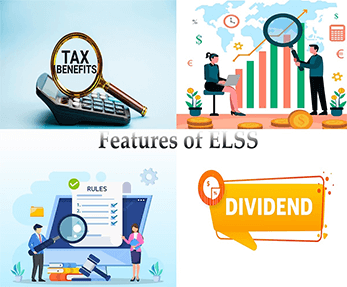
Potential for Capital Appreciation: Due to their equity focus, ELSS funds have the potential to generate capital appreciation over the long term. By investing in a diversified portfolio of stocks across different sectors, ELSS funds aim to provide higher returns compared to traditional tax-saving options.
Professional Fund Management: ELSS funds are managed by professional fund managers who have expertise in equity markets. They conduct research, analyze market trends, and make investment decisions on behalf of investors. This professional management can potentially result in optimized portfolio allocation and better investment outcomes.
Systematic Investment Options: ELSS funds offer the flexibility of systematic investment options such as SIP (Systematic Investment Plan). Investors can invest a fixed amount at regular intervals, allowing for rupee cost averaging and disciplined investing.
Dividend and Growth Options: ELSS funds provide investors with the choice between dividend and growth options. In the dividend option, investors can receive regular dividend payouts, while in the growth option, the returns are reinvested in the fund, leading to compounding of wealth.
Transparency and Regulation: ELSS funds are regulated by the Securities and Exchange Board of India (SEBI), ensuring transparency and investor protection. Regular disclosures of fund performance, portfolio holdings, and other relevant information provide investors with the necessary information to make informed investment decisions.
When should I start investing in ELSS?
The ideal time to start investing in ELSS (Equity Linked Savings Scheme) depends on your financial goals, risk tolerance, and investment horizon. Here are some factors to consider when deciding when to start investing in ELSS:
Tax Planning: ELSS investments provide tax benefits under Section 80C of the Income Tax Act in India. If you have a taxable income and are looking to reduce your tax liability, investing in ELSS can be a beneficial strategy. It’s advisable to start investing in ELSS early in the financial year to take full advantage of the tax benefits.
Long-Term Investment Horizon: ELSS funds are equity-oriented investments and tend to perform better over the long term. Therefore, if you have a long investment horizon, typically five years or more, you have a higher potential to benefit from the growth potential of equities. Starting early allows you to harness the power of compounding and potentially achieve higher returns.

Risk Tolerance: ELSS funds carry market risks due to their exposure to equities. It’s important to assess your risk tolerance and comfort level with market fluctuations. If you have a higher risk appetite and can withstand short-term volatility, you may consider starting your ELSS investments earlier.
Financial Stability: Before investing in ELSS or any other investment, ensure that you have a strong financial foundation in terms of emergency funds and insurance coverage. It’s essential to have sufficient funds to meet unexpected expenses and secure yourself and your dependents financially.
Diversification: Diversification is key to managing risk in investments. If you already have a well-diversified investment portfolio across different asset classes, adding ELSS can further enhance diversification. Starting early allows you to spread your investments over time and benefit from potential market fluctuations.
Market Conditions: While it’s not advisable to time the market, being aware of the overall market conditions can help you make informed investment decisions. Keep track of market trends and consider investing in ELSS when you believe the market offers attractive opportunities for potential growth.
Top Benefits of investing in ELSS
Investing in ELSS (Equity Linked Savings Scheme) funds offers several benefits to investors. Here are the top benefits of investing in ELSS:
Tax Benefits: ELSS funds provide tax benefits under Section 80C of the Income Tax Act in India. Investments in ELSS funds are eligible for a deduction of up to Rs. 1.5 lakh from taxable income in a financial year. This allows individuals to save taxes while investing for their long-term financial goals.
Potential for Higher Returns: ELSS funds primarily invest in equities, which have the potential to generate higher returns compared to traditional tax-saving investment options such as Fixed Deposits (FDs) or Public Provident Fund (PPF). Over the long term, equities have historically outperformed other asset classes, providing the opportunity for capital appreciation and wealth creation.
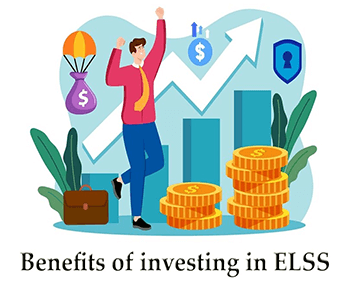
Shortest Lock-in Period: Among various tax-saving investment options, ELSS funds have the shortest lock-in period of just three years. This means investors can access their invested amount after three years, providing liquidity and flexibility compared to longer lock-in periods of other tax-saving instruments.
Equity Exposure and Wealth Creation: ELSS funds offer investors exposure to the equity markets, allowing them to participate in the potential growth of the stock market. By investing in a diversified portfolio of stocks, ELSS funds aim to generate wealth over the long term, making them suitable for investors with a higher risk appetite and a longer investment horizon.
Professional Fund Management: ELSS funds are managed by experienced and skilled fund managers who have expertise in equity investing. These fund managers conduct in-depth research, analyze market trends, and make investment decisions on behalf of investors. Their expertise can potentially result in better investment selection and optimized portfolio allocation.
Flexibility of Investment Amount: ELSS funds offer flexibility in terms of the investment amount. Investors can start with a small amount through systematic investment options like SIP (Systematic Investment Plan). This allows investors to invest regularly and take advantage of rupee cost averaging, which can smoothen the impact of market volatility.
Transparency and Regulatory Oversight: ELSS funds are regulated by the Securities and Exchange Board of India (SEBI), ensuring transparency and investor protection. Regular disclosures of fund performance, portfolio holdings, and other relevant information provide investors with transparency and confidence in their investment decisions.
Potential for Dividends: Some ELSS funds offer dividend options, where investors can receive regular dividend payouts. This can be beneficial for investors looking for a regular income stream along with the potential for capital appreciation.
Top mistakes to avoid while investing in ELSS
Exiting after 3 years: Many investors make the mistake of withdrawing their money from ELSS funds immediately after the 3-year lock-in period ends. However, it’s not always the best decision unless you have achieved your financial goal.
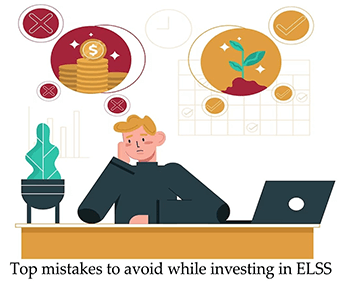
Investing in too many ELSS funds: Investing in multiple ELSS funds can lead to including underperforming funds in your portfolio. It also becomes challenging to keep track of the performance of each fund.
Ignoring Systematic Investment Plan (SIP): The lock-in period starts from the date of each investment. If you don’t opt for SIP and make regular investments, you miss out on the benefit of making your ELSS investment more flexible. Each investment will have a separate lock-in period.
Forgetting about your financial goals: Many investors focus solely on the tax-saving aspect of ELSS and forget to consider their overall financial plan and risk profile. Remember that ELSS is not just a tax-saving instrument, but also an investment opportunity. It’s important to align your investment with your financial goals and risk tolerance.
Disadvantages of investing in ELSS
Lock-in period: ELSS funds have a lock-in period of 3 years, which means you cannot withdraw your money before that time. This makes it less flexible compared to other types of mutual funds.
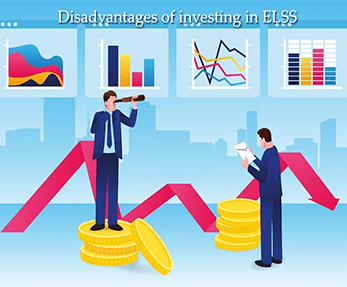
Market Risk: There is a risk involved in ELSS due to changes in the prices of shares in the market. If the prices of the shares fall too much, it can result in a loss of your invested money.
Lack of Control: When you invest in ELSS, professional fund managers handle your money and make investment decisions on your behalf. This means you don’t have direct control over which securities your money is invested in.
Limited total benefit: Even if you invest a large amount in ELSS, you can only get a deduction of up to Rs. 150,000 from your total income under Section 80C of the Income Tax Act.
Limited Tax Benefits: If you have already claimed deductions of Rs. 150,000 from other schemes like PPF (Public Provident Fund), you will not be eligible for an additional deduction under ELSS.
How to choose the right ELSS?
When choosing the right ELSS (Equity Linked Savings Scheme), consider the following factors:
Performance Track Record: Look at the historical performance of the ELSS fund. Consider its performance over different market cycles and compare it with its benchmark index and peers. Look for consistent returns and the fund’s ability to generate long-term growth.
Fund Manager Expertise: Assess the experience and track record of the fund manager managing the ELSS fund. A skilled and experienced fund manager can play a crucial role in achieving investment objectives. Research their investment philosophy, approach, and past performance.
Fund Size and Assets Under Management (AUM): Check the size of the ELSS fund and its AUM. A larger fund size may indicate better stability and the ability to handle larger investments. However, ensure that the fund size is not too large to impact the fund’s flexibility in making investment decisions.

Fund House Reputation: Consider the reputation and credibility of the fund house or asset management company managing the ELSS fund. Look for a fund house with a strong track record, good corporate governance practices, and a focus on investor interests.
Investment Style and Portfolio Composition: Understand the investment style of the ELSS fund, whether it follows a growth-oriented or value-oriented approach. Assess the portfolio composition to determine if it aligns with your risk appetite and investment goals. A well-diversified portfolio across different sectors and market capitalizations may provide better risk management.
Expense Ratio: Compare the expense ratio of different ELSS funds. Lower expense ratios indicate lower costs, which can impact the overall returns. However, do not solely focus on expense ratios; consider it in conjunction with other factors like performance and fund management quality.
Risk Assessment: Evaluate the risk associated with the ELSS fund. ELSS funds invest in equities and can be subject to market volatility. Assess your risk tolerance and choose an ELSS fund that matches your risk appetite.
Fund House Research Support: Consider if the fund house providing the ELSS fund has a strong research team that supports the investment decisions. In-depth research can contribute to better investment selections and portfolio management.
Fund Objectives and Investment Horizon: Align the investment objectives and investment horizon of the ELSS fund with your own financial goals. ELSS funds are suitable for long-term investments due to the mandatory lock-in period of three years. Ensure that the fund’s objectives match your investment time frame.
Past Consistency and Investor Reviews: Review the fund’s performance consistency and read investor reviews or ratings to gain insights into the fund’s reputation and investor satisfaction.
Remember that past performance is not a guarantee of future results, and it’s important to diversify your investments across different asset classes and funds to mitigate risks.
ELSS Tax Details
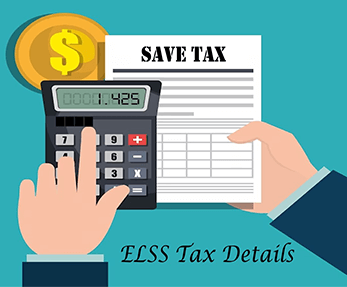
ELSS is a special investment option that can help individuals or families save on their income tax. You can deduct up to Rs. 1,50,000 from your total income by investing in ELSS, which means you can reduce your taxable income by that amount. This deduction is available under Section 80C of the Income Tax Act. By investing in ELSS, you can save up to Rs. 46,800 in taxes.
If you earn long-term capital gains from your ELSS investments that exceed Rs. 1 lakh, you will need to pay a 10% tax on the amount above Rs. 1 lakh. However, there is no benefit of adjusting the gains for inflation, which is called indexation benefit.
One advantage of investing in ELSS is that you don’t have to pay any short-term capital gains tax. This is because ELSS funds have a mandatory lock-in period of 3 years, during which you cannot withdraw the invested money. This lock-in period helps you save on taxes for the short term.
Equity Linked Savings Scheme (ELSS) vs Fixed Deposit (FD) vs National Pension Scheme (NPS) vs Public Provident Fund (PPF)
Factors |
ELSS |
FD |
NPS |
PPF |
|---|---|---|---|---|
Tax Benefits |
Tax deduction up to Rs. 1.5 lakh |
Interest taxable as per income slab |
Tax deduction up to Rs. 1.5 lakh |
Tax deduction up to Rs. 1.5 lakh |
Investment Tenure |
3 years |
Varies (typically 1-10 years) |
Till retirement or 60 years |
15 years (can be extended in blocks) |
Returns |
Market-linked, potential for growth |
Fixed interest rate |
Market-linked, potential for growth |
Fixed interest rate |
Risk Level |
High |
Low to moderate |
Moderate to high |
Low to moderate |
Liquidity |
Locked for 3 years |
Varies based on the tenure |
Partial withdrawals after 3 years |
Partial withdrawals after 7 years |
Flexibility |
Flexible investment amount |
Fixed investment amount |
Flexible investment amount |
Flexible investment amount |
Retirement Focus |
No specific retirement benefits |
No specific retirement benefits |
Focus on retirement savings |
Focus on retirement savings |
Investment Allocation |
Primarily in equities |
Bank deposit |
Equities and debt instruments |
Debt instruments |
Contribution Limit |
No specific limit |
No specific limit |
No specific limit |
No specific limit |
Lock-in Period |
3 years |
Varies (no lock-in for some FDs) |
Till retirement or 60 years |
15 years (can be extended in blocks) |
Withdrawal Flexibility |
Can withdraw after the lock-in |
Premature withdrawals may incur penalties |
Partial withdrawals allowed after 3 years |
Partial withdrawals allowed after 7 years |
Control over Investments |
Managed by professional fund managers |
No control, fixed interest rate |
Individual choice of investments |
Limited control, government-regulated |
It’s important to consider individual financial goals, risk appetite, and investment preferences while selecting the most suitable option among ELSS, FD, NPS, and PPF.

